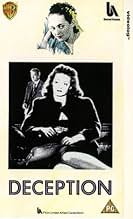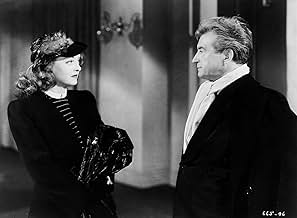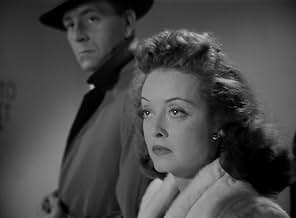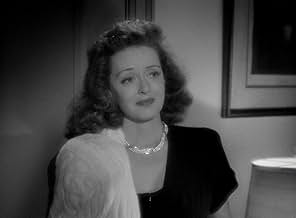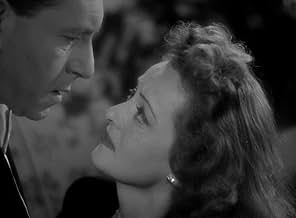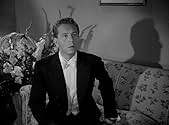ÉVALUATION IMDb
7,1/10
4,5 k
MA NOTE
Ajouter une intrigue dans votre langueAfter marrying her long-lost love, a musician finds the relationship threatened by a wealthy composer who is besotted with her.After marrying her long-lost love, a musician finds the relationship threatened by a wealthy composer who is besotted with her.After marrying her long-lost love, a musician finds the relationship threatened by a wealthy composer who is besotted with her.
- Director
- Writers
- Stars
- Prix
- 4 victoires au total
John Alban
- Concertgoer
- (uncredited)
Russell Arms
- Music Student
- (uncredited)
Lois Austin
- Norma - Wedding Guest
- (uncredited)
Patricia Barry
- Music Student
- (uncredited)
Brandon Beach
- Concertgoer
- (uncredited)
Lulu Mae Bohrman
- Restaurant Diner
- (uncredited)
Paul Bradley
- Concertgoer
- (uncredited)
James Carlisle
- Restaurant Diner
- (uncredited)
Gertrude Carr
- Wedding Guest
- (uncredited)
James Conaty
- Well-Wisher at Concert
- (uncredited)
Marcelle Corday
- Hat Check Woman
- (uncredited)
Gino Corrado
- Waiter
- (uncredited)
Suzi Crandall
- Music Student
- (uncredited)
Avis en vedette
On a recent Turner Classic Movies broadcast, I finally caught up with all of this one, having seen only snippets of it before. Everybody involved was obviously given free rein, from the lead actors all the way through to every behind-the-scenes artisan, the best that Warner Brothers could muster at the time. Claude Rains and Bette Davis spar in magnificent style, with Rains, stroking the fur of his pet Siamese cat, winning by default, since he was given a role which is so over-the-top that, in the hands of a lesser actor, it would have verged on outrageous camp. (Check out the rococo New York brownstone mansion in which he's ensconced, more magnificent than anything a lesser studio could provide for a monarch in a story involving royalty!)
Poor Paul Henreid has a particularly thankless role to play, swinging like an erratic pendulum between jealous tantrums and thoroughly deceived naïveté, but his simulations of the movements of a top-flight cello musician are convincing enough to allow all to be forgiven.
Erich Wolfgang Korngold's music is probably the film's chief asset and it probably sounded superb over the monophonic sound systems when this film was released, since Warners' sound technicians were the best in Hollywood back then. (Unfortunately the soundtrack during the telecast I heard was very wobbly - a real disappointment. Wonder what the problem was, since this certainly isn't the case with many films dating even further into the past.)
While it may not be a delicacy fit for a cinematic gourmet, it's more than passably entertaining for its nearly two-hours running time.
Poor Paul Henreid has a particularly thankless role to play, swinging like an erratic pendulum between jealous tantrums and thoroughly deceived naïveté, but his simulations of the movements of a top-flight cello musician are convincing enough to allow all to be forgiven.
Erich Wolfgang Korngold's music is probably the film's chief asset and it probably sounded superb over the monophonic sound systems when this film was released, since Warners' sound technicians were the best in Hollywood back then. (Unfortunately the soundtrack during the telecast I heard was very wobbly - a real disappointment. Wonder what the problem was, since this certainly isn't the case with many films dating even further into the past.)
While it may not be a delicacy fit for a cinematic gourmet, it's more than passably entertaining for its nearly two-hours running time.
...Of Claude Rains' character in this picture. As has been stated, he is an older guy who loses out on Bette Davis to a younger guy. The younger guy is Paul Henreid playing a WWII survivor, thought dead by Davis. When she spots him at a concert in NYC years later, the handwriting is on the wall for Rains.
The mise en scene is the world of classical music, about which I know little but which sounds, uh, classical in several pieces played during the film. Henreid plays a cellist, so the pieces for the cello leave me out completely. Rains is a master composer, a genius referred to by his last name, Hollenius, thereby cementing his genius label. Not only is he a genius, he is a vengeful genius.
One does not often encounter such a high level of acting as that found in "Deception", and it elevates the film above the ordinary. All three principals are outstanding, especially Rains, whose performance towers over the other two. It is a character study and a straight drama. Speaking for myself I was not aware of any elements of 'noir', but if you are a fan of good acting, "Deception" is for you, as it is exceptional in this department.
The mise en scene is the world of classical music, about which I know little but which sounds, uh, classical in several pieces played during the film. Henreid plays a cellist, so the pieces for the cello leave me out completely. Rains is a master composer, a genius referred to by his last name, Hollenius, thereby cementing his genius label. Not only is he a genius, he is a vengeful genius.
One does not often encounter such a high level of acting as that found in "Deception", and it elevates the film above the ordinary. All three principals are outstanding, especially Rains, whose performance towers over the other two. It is a character study and a straight drama. Speaking for myself I was not aware of any elements of 'noir', but if you are a fan of good acting, "Deception" is for you, as it is exceptional in this department.
I'll dispense with the details of the plot and move directly to Mr. Rains' performance as Hollenius the composer in this musico-melodrama.
This is his show although Davis and Henreid attempt to hold their own in this film.
His flair for manipulation and deception, hence the title, dominates the film.
He does a great job of it, driving everyone crazy with his shenanigans and jealousy.
The cinematography is well done and the story's setting in the world of post-WW II classical/modern music is interesting.
I noted that early on, for instance, as Henreid finished a performance, audience members asked him who his favorite living composer was..."Sibelius...or Shostakovich...?" No mention of Aaron Copland or the many other composers alive at the time.
Hollenius' work as a composer was a curious mix of tonal, traditional and slightly atonal influences, attempting to display "modern" music but watered down to keep the audience and us interested.
The mimicking of the piano and cello performances by all three actors was fairly well done.
I found it quite interesting too that both Davis and Rains were not "starving artists" like Henreid. Opulent apartments and lifestyles for piano teachers and composers were not common, but these two were well-off in an even garish sense.
This was not the reality of the time in the music world.
I'd recommend this film if you're a Rains or Davis fan. Henreid was not used for his full potential.
This is his show although Davis and Henreid attempt to hold their own in this film.
His flair for manipulation and deception, hence the title, dominates the film.
He does a great job of it, driving everyone crazy with his shenanigans and jealousy.
The cinematography is well done and the story's setting in the world of post-WW II classical/modern music is interesting.
I noted that early on, for instance, as Henreid finished a performance, audience members asked him who his favorite living composer was..."Sibelius...or Shostakovich...?" No mention of Aaron Copland or the many other composers alive at the time.
Hollenius' work as a composer was a curious mix of tonal, traditional and slightly atonal influences, attempting to display "modern" music but watered down to keep the audience and us interested.
The mimicking of the piano and cello performances by all three actors was fairly well done.
I found it quite interesting too that both Davis and Rains were not "starving artists" like Henreid. Opulent apartments and lifestyles for piano teachers and composers were not common, but these two were well-off in an even garish sense.
This was not the reality of the time in the music world.
I'd recommend this film if you're a Rains or Davis fan. Henreid was not used for his full potential.
Bette Davis believed her true love Paul Henreid was killed in battle. When he returns, their romance is rekindled But during the time he was believed dead, Bette had become involved with composer Claude Rains. Claude's not very happy losing her to Henreid. So Bette must take steps to ensure he doesn't ruin their happiness.
Paul Henreid is the weak link in this dynamic trio of stars. But, to be fair, he doesn't have the juiciest part. Bette is at her soap operatic best here, serving up her role with a hefty side of ham. Claude Rains owns every scene he's in. Like Bette, the man knew his way around a melodramatic role. Unlike Bette (usually), Rains could keep from going over-the-top. He's a better actor, quite frankly. But stars like Bette Davis and Joan Crawford aren't beloved for their realistic acting. People like them for their enjoyable excesses. They were the precursors to the television soap opera stars that would come decades later.
Wonderful sets and costumes, filmed beautifully. Glamorous production from Warner Bros. Loved the Erich Wolfgang Korngold score, as well as the other classical pieces featured. It's a fine melodrama with touches of film noir. Great performances from Davis and Rains. Fans of both will enjoy this one.
Paul Henreid is the weak link in this dynamic trio of stars. But, to be fair, he doesn't have the juiciest part. Bette is at her soap operatic best here, serving up her role with a hefty side of ham. Claude Rains owns every scene he's in. Like Bette, the man knew his way around a melodramatic role. Unlike Bette (usually), Rains could keep from going over-the-top. He's a better actor, quite frankly. But stars like Bette Davis and Joan Crawford aren't beloved for their realistic acting. People like them for their enjoyable excesses. They were the precursors to the television soap opera stars that would come decades later.
Wonderful sets and costumes, filmed beautifully. Glamorous production from Warner Bros. Loved the Erich Wolfgang Korngold score, as well as the other classical pieces featured. It's a fine melodrama with touches of film noir. Great performances from Davis and Rains. Fans of both will enjoy this one.
Irving Rapper's "Deception" reunited the three stars of a much better Bette Davis' vehicle: "Now Voyager". This is a film where all three stars shine equally. "Deception" was based on a play and the adaptation has opened it in unexpected ways. This satisfying melodrama has one thing going for it: the great music one hears throughout the movie, it's highlight being the Korngold Cello concerto, a rarity seldom heard, let alone in films. We are also treated to the beginning of Beethoven's Apassionata sonata as well.
Christine Radcliffe is a musician who gets separated from the love of her life, Karel Novak, one of the best cellist of Europe, before the advent of WWII. Christine comes back to New York, where she becomes the lover of a famous composer, Alexander Hollenius. One day, Christine discovers Karel's name playing in a second class venue in Manhattan, where they are reunited.
Christine doesn't have the nerve to tell Karel about what has happened in the intervening years. It's obvious Christine has done well for herself, as Karel discovers Christine lives in a great apartment, he finds closets full of elegant and expensive clothes, furs, jewelry, which doesn't make sense to him. Little does he know everything has come out of the generosity of Alexander Hollenius, a composer that fell in love with Christine and obviously, became her lover. Christine is coy in not revealing the truth, which keeps interfering with her happiness, until it comes to a head as Hollenius threatens Christine to tell it all to Karel after he plays the concert. It's at that point that Christine realizes she is cornered and must face reality and the fact that she will lose the man she really loves.
Bette Davis made a fine Christine, a woman she was born to play. Ms. Davis is amazing in the film, which unfortunately, is forgotten by all her admirers when comparing this role to her other great screen portraits. Claude Rains, who worked so well with Ms. Davis, gives an incredible performance as the egotistical composer who is afraid to lose his own creation. This has to be one of Mr. Rains' best appearances in a film. Paul Henried is perfect as Karel, the European cellist madly in love with Christine, a woman he thought he had lost forever. Mr. Henried is an elegant figure in this film, something that he projected effortlessly.
Ernest Haller's cinematography greatly enhances all we see on the screen. Mr. Haller was one of the best photographers working in that period, as he clearly shows here. George James Hopkins' sets not only are opulent, but he clearly knew how to get the most of his interior designs.
The film is an engrossing tale that will satisfy the fans of this genre.
Christine Radcliffe is a musician who gets separated from the love of her life, Karel Novak, one of the best cellist of Europe, before the advent of WWII. Christine comes back to New York, where she becomes the lover of a famous composer, Alexander Hollenius. One day, Christine discovers Karel's name playing in a second class venue in Manhattan, where they are reunited.
Christine doesn't have the nerve to tell Karel about what has happened in the intervening years. It's obvious Christine has done well for herself, as Karel discovers Christine lives in a great apartment, he finds closets full of elegant and expensive clothes, furs, jewelry, which doesn't make sense to him. Little does he know everything has come out of the generosity of Alexander Hollenius, a composer that fell in love with Christine and obviously, became her lover. Christine is coy in not revealing the truth, which keeps interfering with her happiness, until it comes to a head as Hollenius threatens Christine to tell it all to Karel after he plays the concert. It's at that point that Christine realizes she is cornered and must face reality and the fact that she will lose the man she really loves.
Bette Davis made a fine Christine, a woman she was born to play. Ms. Davis is amazing in the film, which unfortunately, is forgotten by all her admirers when comparing this role to her other great screen portraits. Claude Rains, who worked so well with Ms. Davis, gives an incredible performance as the egotistical composer who is afraid to lose his own creation. This has to be one of Mr. Rains' best appearances in a film. Paul Henried is perfect as Karel, the European cellist madly in love with Christine, a woman he thought he had lost forever. Mr. Henried is an elegant figure in this film, something that he projected effortlessly.
Ernest Haller's cinematography greatly enhances all we see on the screen. Mr. Haller was one of the best photographers working in that period, as he clearly shows here. George James Hopkins' sets not only are opulent, but he clearly knew how to get the most of his interior designs.
The film is an engrossing tale that will satisfy the fans of this genre.
Le saviez-vous
- AnecdotesPaul Henreid could not play the cello. While he was able to fake it in the long shots, to achieve the illusion in closeup, he wore a special jacket with no sleeves and holes for two real cellists to insert their arms - one to bow, and one to accurately finger the music - while seated behind him, out of shot.
- GaffesWhile Christine, alone in her studio, is talking to Alexander Hollenius on the telephone, the highly visible shadow of a crew member is moving back and forth across the piano behind her.
- Citations
Alexander Hollenius: [snatches his bleeding hand away from Christine] Like all women - white as a sheet at the sight of a couple of scratches... calm and smiling like a hospital nurse in the presence of a mortal wound... Good night!
- ConnexionsEdited into Les Cadavres ne portent pas de costard (1982)
- Bandes originalesHollenius' Cello Concerto
Music by Erich Wolfgang Korngold
Performed by Paul Henreid (dubbed by Eleanor Slatkin)
Meilleurs choix
Connectez-vous pour évaluer et surveiller les recommandations personnalisées
- How long is Deception?Propulsé par Alexa
Détails
- Durée1 heure 55 minutes
- Couleur
- Rapport de forme
- 1.37 : 1
Contribuer à cette page
Suggérer une modification ou ajouter du contenu manquant





